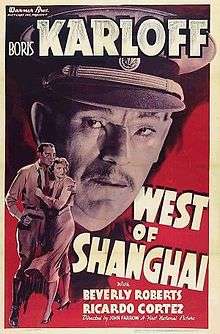West of Shanghai
| West of Shanghai | |
|---|---|
 Film poster | |
| Directed by | John Farrow |
| Produced by |
Hal B. Wallis Jack L. Warner |
| Screenplay by | Crane Wilbur |
| Based on |
The Bad Man 1920 play by Porter Emerson Browne |
| Starring |
Boris Karloff Beverly Roberts Ricardo Cortez Gordon Oliver |
| Music by | Heinz Roemheld |
| Cinematography | L. William O'Connell |
| Edited by | Frank DeWar |
| Distributed by | Warner Bros. |
Release dates |
|
Running time | 64 minutes |
| Country | United States |
| Language | English |
West of Shanghai is a 1937 American adventure film directed by John Farrow and starring Boris Karloff as a Chinese warlord. Other films based on the same play included The Bad Man directed by Edwin Carewe and starring Holbrook Blinn, and a 1930 film of the same title directed by Clarence Badger and starring Walter Huston. In 1941, M-G-M made a version entitled The Bad Man, starring Wallace Beery and Ronald Reagan and directed by Richard Thorpe.[1]
Plot
On a train bound for lawless northern China, businessman Gordon Creed (Ricardo Cortez) encounters acquaintance Myron Galt (Douglas Wood) and his attractive daughter Lola (Sheila Bromley). Galt is on his way to foreclose on a very promising oilfield built up by Jim Hallet (Gordon Oliver). Creed, on the other hand, wants to offer Hallet enough money to pay off his loan from Galt (for a tidy share of the oilfield).
Creed is annoyed when his reserved compartment is appropriated by General Chow Fu-Shan (Vladimir Sokoloff). The general is on his way to deal with self-styled General Wu Yen Fang (Boris Karloff), a warlord who has taken control of a province. However, Chow Fu-Shan is assassinated on the train by one of Fang's men.
After being questioned by military governor General Ma (Tetsu Komai), the three travel by horse to a remote town, where they find not only Hallet (Gordon Oliver), but Creed's estranged wife Jane (Beverly Roberts), who is working for missionary Dr. Abernathy (Gordon Hart). Then, Fang's subordinate, Captain Kung Nui (Chester Gan) and his men take over the town. When Kung Nui casts his eyes on Jane, Hallet impulsively punches him. Jane and Hallet have fallen in love, though she does not believe in divorce and has kept their relationship strictly platonic. Hallet is knocked out and imprisoned.
When Fang arrives, he tries to persuade Jane to go with him, promising she would enjoy it (blithely explaining "I am Fang"). Hallet escapes with the help of an associate disguised as one of Fang's soldiers, and sends him to notify General Ma of Fang's whereabouts. Hallet then breaks in on Fang and Jane's private discussion. Fortunately for Hallet, Fang remembers him. Hallet once hid a coolie and dug three bullets out of his shoulder; that was Fang before his meteoric rise. The warlord decides to help his benefactor. Fang robs Creed of $50,000, uses it to pay Galt what Hallet owes, then takes the money and offers it to Dr. Abernathy.
Creed bribes Captain Kung Nui to rebel against Fang. Kung Nui wants to regain face by having Hallet executed. Fang pretends to give in, but just before a firing squad shoots the oilman, Fang has his right-hand man, Mr. Cheng (Richard Loo), kill Kung Nui. Afterward, Fang personally shoots Creed to fix Hallet's romantic problem, but only manages to wound him.
Government troops arrive and force their way into the town. In the confusion, Jane, accompanied by Hallet, goes to attend to her husband's wound. Creed produces a gun and announces that Hallet is going to have a fatal accident, but is killed by Fang.
With the battle lost, Fang decides to surrender rather than risk the lives of his captives by fighting to the end. He is taken out and shot.
Cast
- Boris Karloff as General Wu Yen Fang
- Beverly Roberts as Mrs. Jane Creed
- Ricardo Cortez as Gordon Creed
- Gordon Oliver as Jim Hallet
- Sheila Bromley as Lola Galt
- Douglas Wood as Myron Galt
- Vladimir Sokoloff as General Chow Fu-Shan
- Gordon Hart as Dr. Abernathy
- Richard Loo as Mr. Cheng
- Chester Gan as Captain Kung Nui
- Tetsu Komai as General Ma
Production
The film was known during production as War Lord and China Bandit. It was a remake of a play and novel The Bad Man.[2]
See also
References
- ↑ "Detail view of Movies Page". Retrieved March 5, 2016.
- ↑ Stephen Jacobs, Boris Karloff: More Than a Monster, Tomohawk Press 2011 p 213
External links
| Wikiquote has quotations related to: West of Shanghai |
- West of Shanghai at the Internet Movie Database
- West of Shanghai at the TCM Movie Database
- West of Shanghai at AllMovie
- West of Shanghai at the American Film Institute Catalog